6 Productivity Tools Every Teacher Should Know About
Educators say these tools can drastically reduce administrative and planning burdens, freeing up time for engaging with students.
Your content has been saved!
Go to My Saved Content.It’s no secret that a teacher’s day is filled with a multitude of tasks, many of which are completed outside of school hours. Research shows, in fact, that the average teacher puts in nearly 11 hours of work each day—three more than they’re paid for—once you factor in time spent on lesson planning, completing administrative tasks, emailing, and analyzing and documenting students’ academic performance.
Tools that can save teachers time on some of these tasks are of the utmost importance, and with recent advances in AI, a hoard of new options have appeared that promise to do just that. But determining which of these tools are truly useful is another time-consuming task—which is why we asked our audience of educators what tools they find most useful these days for increasing their productivity.
They pointed us to a handful that help them more easily do things like plan lessons, create assessments, manage some administrative tasks, and improve their efficiency in communicating with students and families.
Rather than point you to the popular tools that many of you are likely familiar with by now—ChatGPT and Canvas, for example—we’ve focused on curating a list of tools you may not have heard of, or haven’t yet tried, and we’ll share teachers’ input on how they can be used to save you valuable time and effort.
MagicSchool
MagicSchool.ai was developed by teachers, and according to educator Tiffany Sutter, it’s “a teacher’s best friend.” Sutter says she uses MagicSchool to “create lesson plans and questions for passages, differentiate texts, write letters of recommendation, identify accommodations for students, design math and reading work, and summarize YouTube videos.”
The tool can generate text outputs for almost any purpose or need, including emails to parents, worksheets, multiple choice questions, custom thank-you notes, and gift ideas.
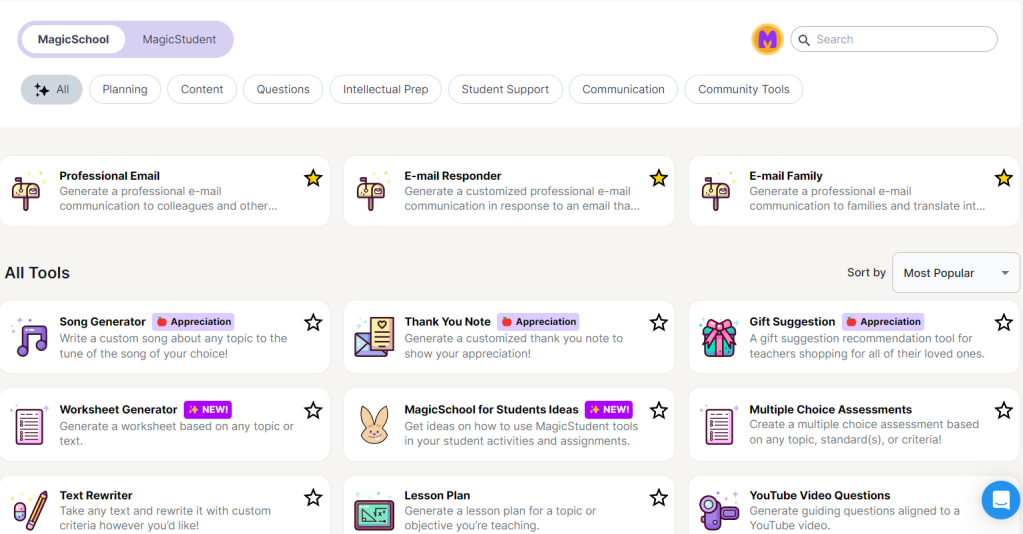
High school social studies teacher Kristen Starnes told Edutopia that she often uses MagicSchool to create high-quality text from a prompt. For example, in an 11th-grade world history class, she will ask it to write a specific number of pages on a topic as broad as “British imperialism in India, including the concept of nonviolent resistance, replete with relevant literature from both British and Indian authors.”
While the text won’t be perfect—it must be vetted for accuracy, as with all AI-generated text—Starnes said the output buys her time she would have spent researching on her own, and is generally a useful starting point to help her introduce difficult, broad concepts to students quickly.
Diffit
If you’re on the hunt for a tool to help you solely with differentiation, Diffit may be just the thing. Educator Michele Haiken calls Diffit an ideal tool to enable “all students—regardless of reading level—to access grade level concepts, while providing curriculum-aligned reading practice in students’ zone of proximal development.”
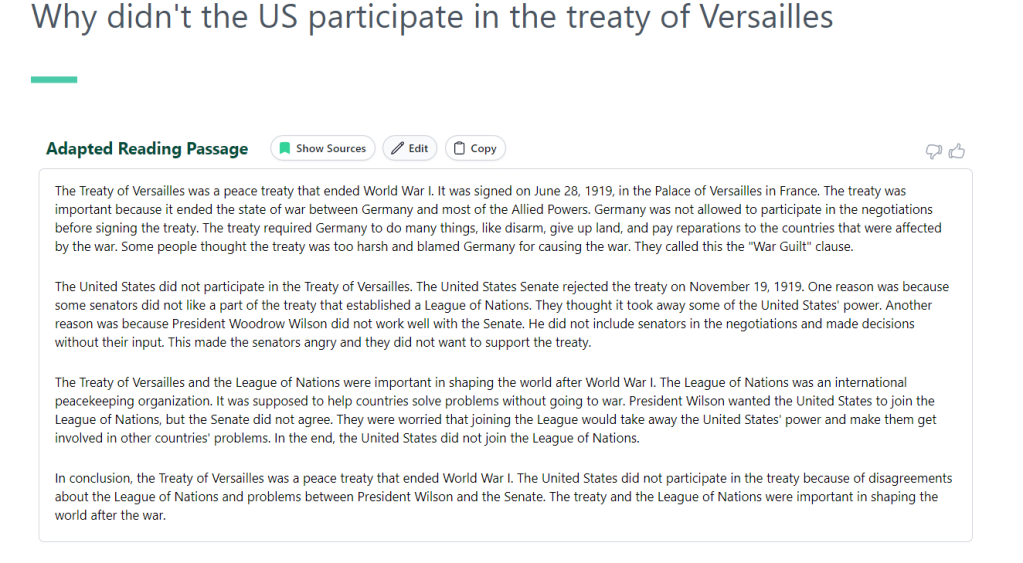
Diffit can take writing from various formats—pdfs, slides, Word or Google docs, or even transcripts from YouTube videos—and parse and distill the text into simpler or more complex language, depending on your students’ needs.
In addition to differentiating reading for students in various grade levels, or for varying reading levels within one classroom, Diffit can also produce summaries, vocabulary lists, and questions from the text, as well as translate the text into different languages.
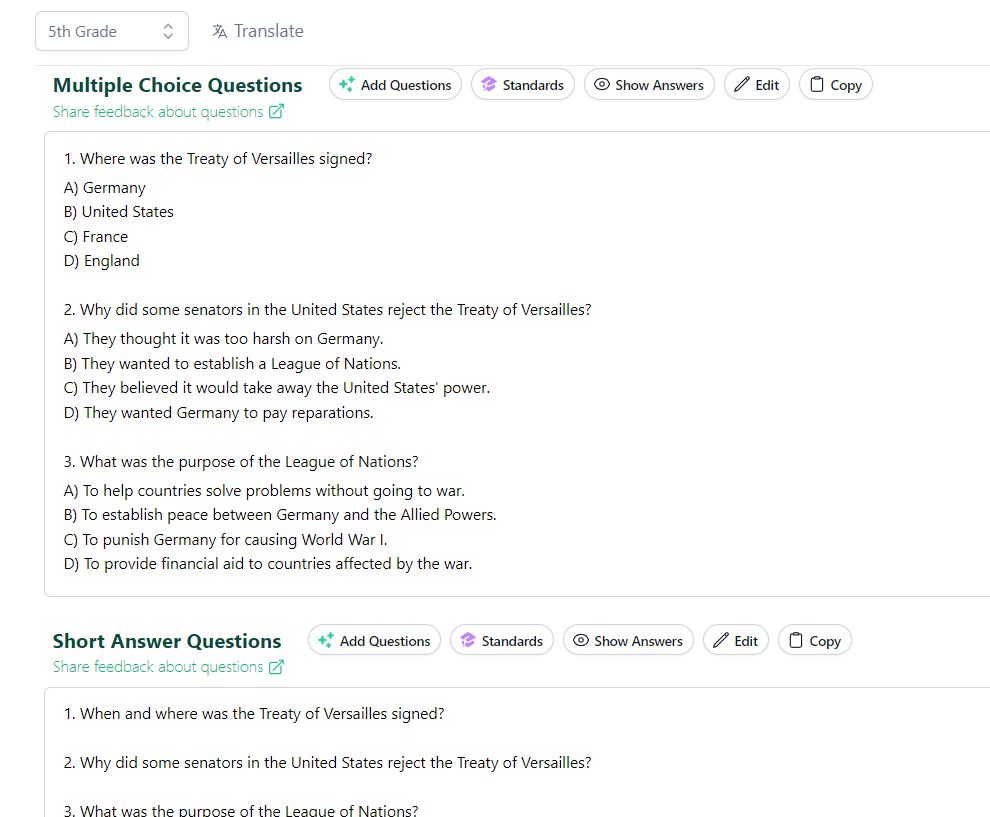
Many teachers say they use the app to generate assessments based on the text it creates—both multiple choice and open-ended questions—that can be tweaked as needed.
Curipod
Curipod helps teachers create scaled, interactive lessons complete with presentations, background information, images, polls, word clouds, exit tickets, and more.
What makes the tool stand out, however, is the automated feedback it can provide to students on the assessments they complete on the platform—feedback that high school science teacher Bonnie Nieves says is accurate, helps kids learn from their mistakes promptly, and frees her up “to be able to pull the kids aside that are not doing well and be able to support them myself.”
Nieves told Edutopia that when she asked Curipod to create a lesson on one of her most difficult subjects, gene editing in biotechnology, the output wasn’t perfect but did draw from a wide body of knowledge—effectively conducting the sort of research and planning that would have taken her hours to do on her own.
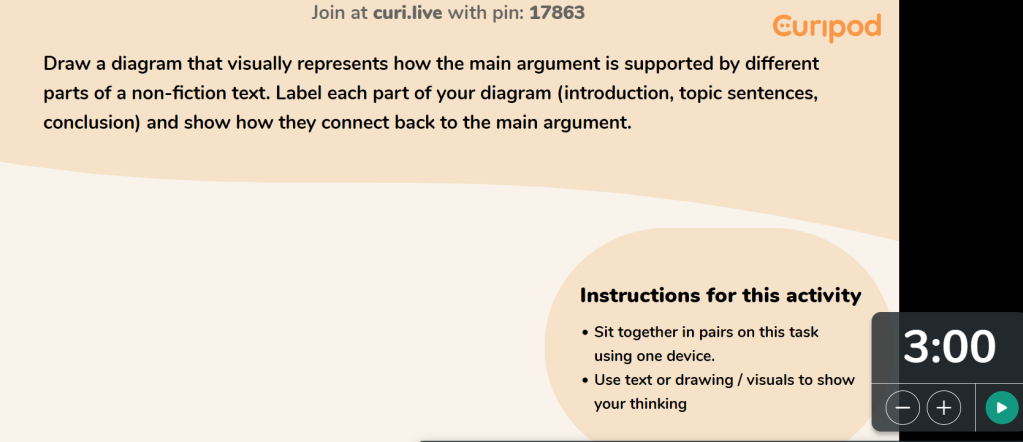
Middle school math teacher Shanna Martin says she finds Curipod useful for the interactive presentations it can easily whip up, but what sets those presentations apart are the various types of questions—from open-ended, to drawing based, to multiple choice—that the tool will weave into presentations.
“This variety ensures that students are actively engaged and can demonstrate their understanding in different ways,” Martin said.
Kami
This Chrome extension can help you quickly elevate feedback to students, making it more interactive and relevant.
Kami allows teachers to annotate various file types—pdfs, scanned documents, images, and more—with comments, drawings, and audio and visual comments. Educator Lexi Rose says she uses Kami daily. “It’s great for annotating documents/pdfs from Google Drive on your SmartBoard,” she writes, adding that her older students also use it to complete worksheets quickly and take notes.
This helps Rose quickly provide personalized feedback on student assignments, including audio and video feedback that might give students more clarity than simple written comments. The tool is a two-way street, too, as students can interact with the feedback they receive in the form of drawings, written responses, and audio and video comments. For an example of what this exchange can look like, check out this video.
Kami can also be used to digitize worksheets, exams, and any other printed material teachers might normally distribute to or collect from students—which can save tons of time at the printer each morning and reduce the amount of clutter in the classroom. Digitizing these workflows can also help streamline grading, as you can use Kami to quickly grade assignments, leave feedback, and return them to students online.
Educator Stephanie Rothstein says Kami’s collaborative learning and whiteboard tools make it a great replacement for Google Jamboard, which the company has announced will be shut down later this year. According to Rothstein, Kami offers security options that allow teachers to turn off particular features for students. “Students can add annotations and can only alter their own text,” Rothstein said—the security options prevent students from moving or deleting the work of other students.
Classroomscreen
To create an easier classroom management experience, many educators turn to the web-based app Classroomscreen, which is full of interactive and customizable widgets such as timers, clocks, group randomizers, polls, classroom noise level monitors, and more. Educator Caitlin Grisham calls the app “indispensable,” while Mike Bettes says he’s found the various widgets “super handy” for cutting down on administrative tasks and providing him more time for teaching.
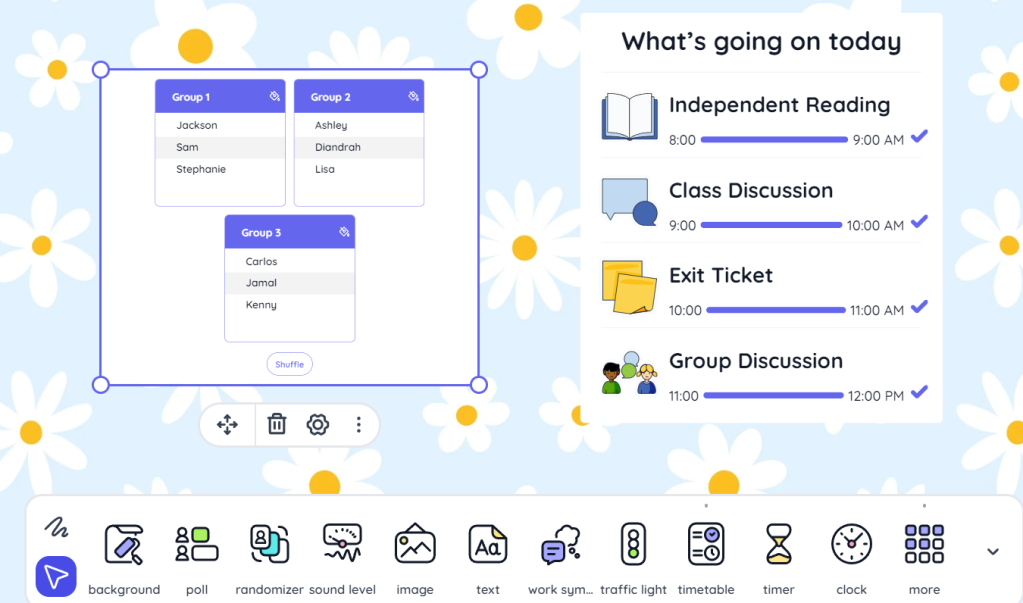
The timers and stopwatches are useful for keeping students on task, keeping track of timed activities, and pacing lessons and classroom transitions.
The randomizing functionality, meanwhile, saves time when it comes to doing things like forming groups, choosing students to answer questions, or deciding what order students present information to the class—while keeping decision making objective and fair.
Text Blaze
This Chrome extension can help teachers more efficiently communicate with students, parents, and others by letting them easily grab “snippets” of frequently used text that can be inserted into any text field with a simple shortcut. High school English teacher D.J. Conger says that the tool saves her “so much time entering oft repeated messages.”
According to educators, Text Blaze comes in handy for comments on student work related to common errors—comments that are often written over and over during the grading process. (Watch this video to get a sense of what this looks like in real time.) The tool is also useful for communications with parents or students over email, in which teachers may receive similar questions and find themselves spending time writing out the same response over and over.
Templates that teachers develop can also include placeholders for customization, which educator Med Kharbach writes helps ensure that teachers can “maintain a personal touch in their communications without the time-consuming process of typing out each message from scratch.” Reducing the time spent on administrative tasks like these can help teachers “free up more time for meaningful educational activities,” Kharbach added.
If there are tools you think we should add to this list—very effective, but not used as much as you think they should be—please tell us in the comments.
